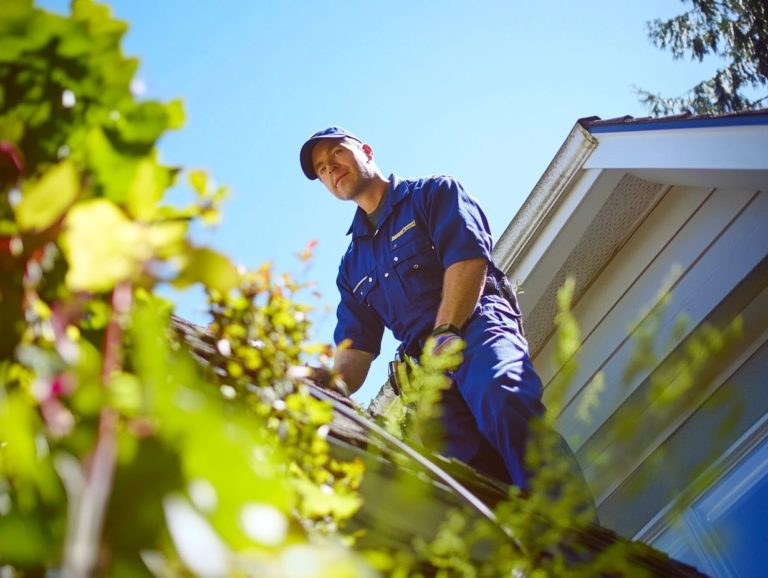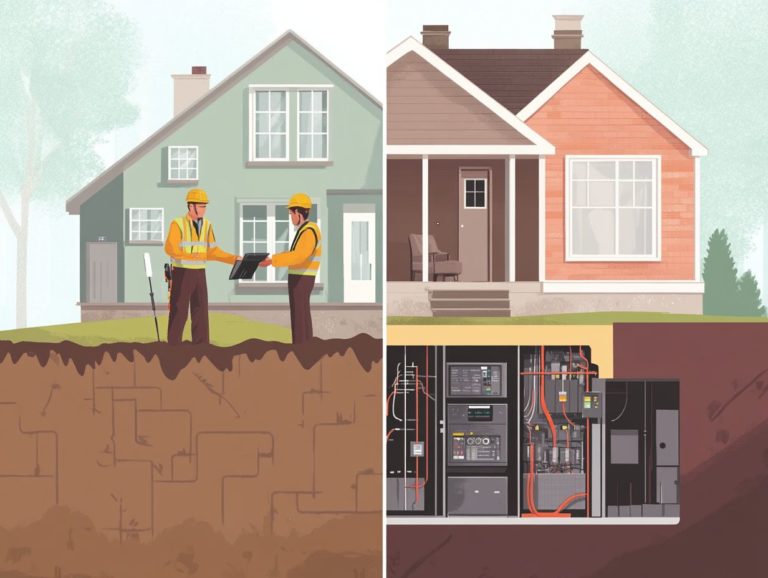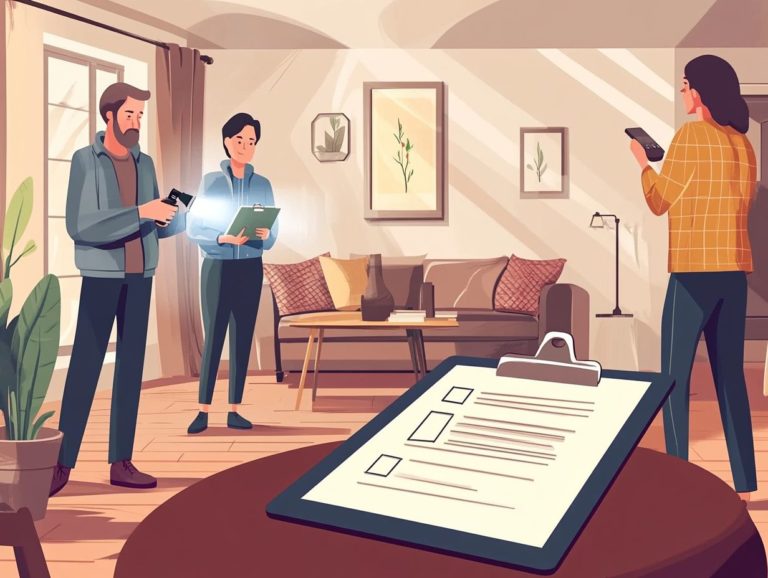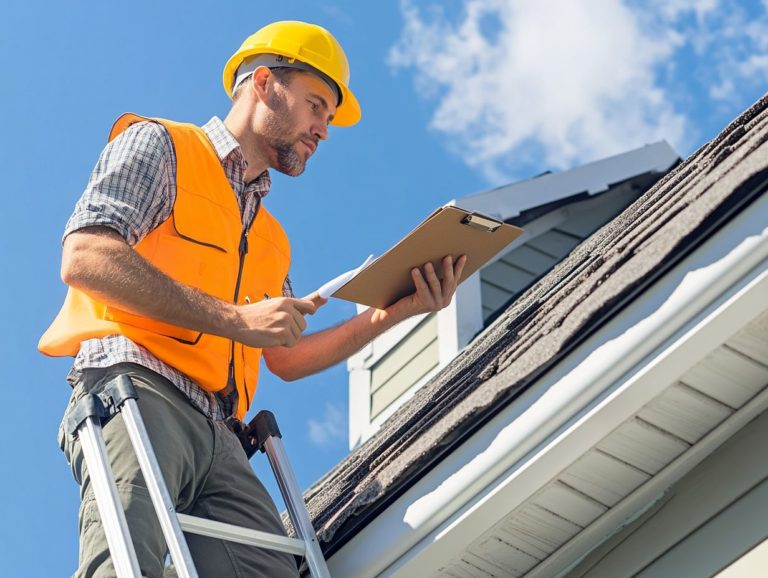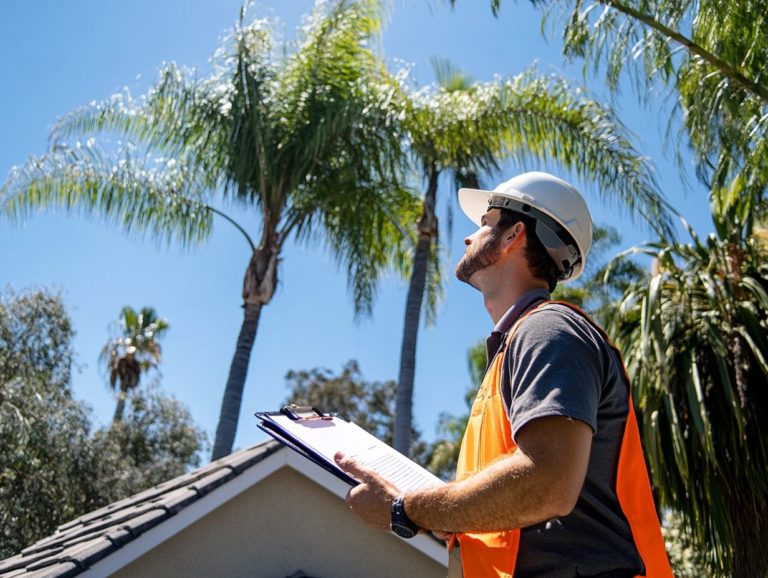The Importance of Home Inspections for Investment Properties
Investing in real estate can be a rewarding venture, but it’s important to acknowledge the risks involved. One essential step to safeguard your investment is conducting a thorough home inspection.
This guide will equip you with everything you need to know about home inspections for investment properties. You’ll delve into their significance and benefits, learn when to schedule one, and understand what to expect during the process.
You ll also discover how to select the right inspector and effectively address any issues that may arise, ensuring your investment remains sound and secure.
Jump in and discover how a home inspection can be your best friend in real estate investing.
Contents
- Key Takeaways:
- Understanding Home Inspections for Investment Properties
- Benefits of Home Inspections for Investment Properties
- When to Schedule a Home Inspection
- What to Expect During a Home Inspection
- Choosing the Right Home Inspector
- Addressing Issues Found in a Home Inspection
- Frequently Asked Questions
- What is the importance of home inspections for investment properties?
- How do home inspections benefit investors?
- Can home inspections help identify potential safety hazards?
- Are home inspections necessary for new construction investment properties?
- Who should conduct home inspections for investment properties?
- How often should investors schedule home inspections for their investment properties?
Key Takeaways:
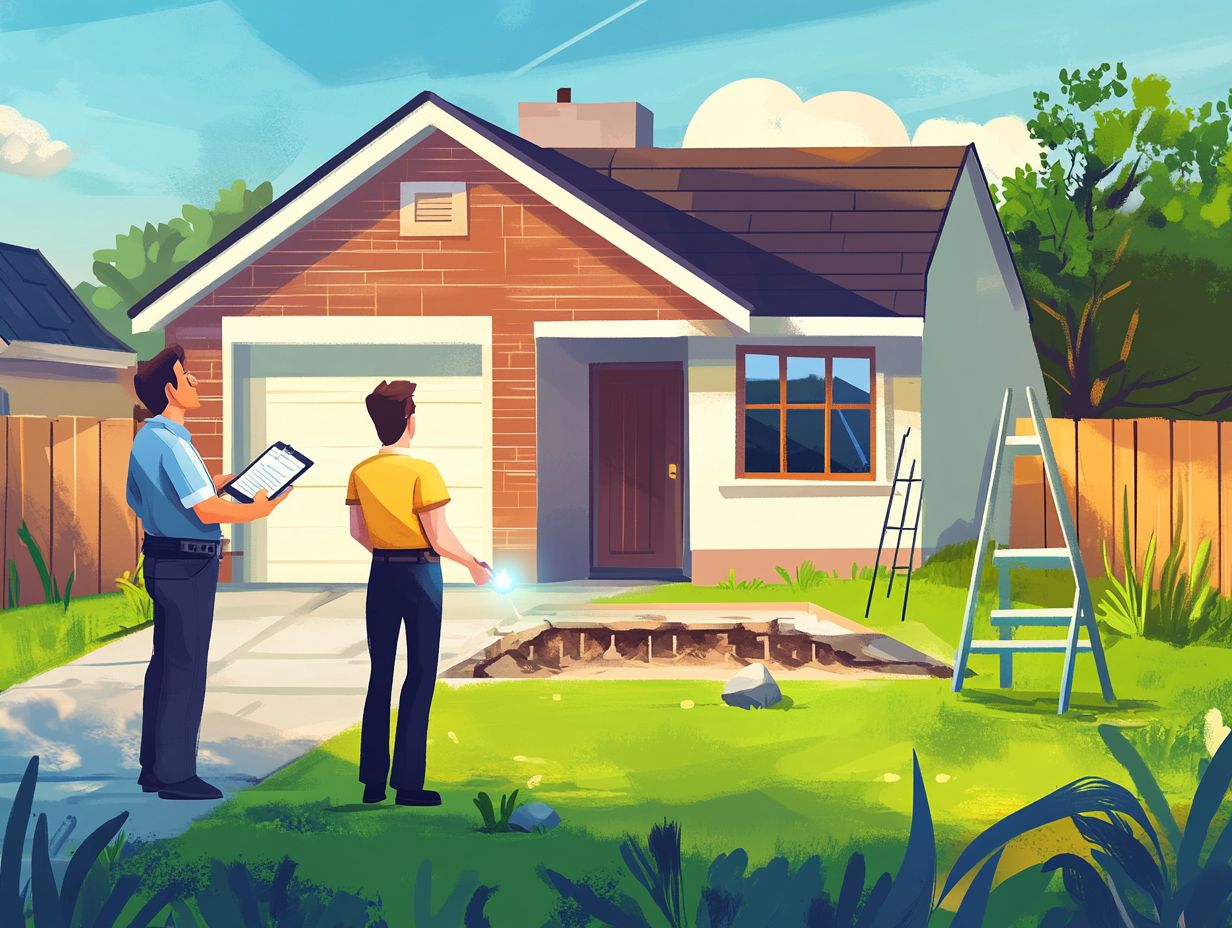
1. A home inspection is vital for investment properties to identify potential issues and ensure safety and compliance, highlighting the importance of home inspections for property investors.
2. Scheduling a home inspection at the right time can save money and help in negotiating with sellers for repairs.
3. Choose a qualified and experienced home inspector to thoroughly assess the property and address any issues found.
Understanding Home Inspections for Investment Properties
Home inspections for investment properties are an important step when buying a property, as they offer you a thorough analysis of the property’s condition. This can safeguard your money and help you understand the importance of home inspections in real estate for making informed decisions.
This vital evaluation reveals hidden issues, including structural deficiencies and adherence to safety regulations, giving you the power to grasp the potential pitfalls in your investment journey.
What is a Home Inspection and Why is it Important?
A home inspection is your ticket to a thorough evaluation of a property’s major systems and structural elements, essential for pinpointing any potential repairs and ensuring compliance with safety regulations.
This comprehensive examination typically covers everything from the roof to the plumbing, electrical systems, and HVAC units (heating, ventilation, and air conditioning systems), among others. By participating in this process, you can uncover hidden issues that might otherwise escape your notice, ultimately affecting both the financial viability of your investment and the well-being of future tenants.
A well-executed inspection offers you peace of mind. It equips you with the knowledge needed to make informed decisions and opens the door for negotiations on repairs or adjustments in the sale price.
Investing in a home inspection is essential; it highlights the importance of pre-purchase home inspections and lays the groundwork for a successful property ownership experience.
Benefits of Home Inspections for Investment Properties
Home inspections offer a wealth of advantages for investment properties. By understanding the importance of home inspections for property buyers, you can identify potential repairs early, safeguard your financial security, and maximize your rental income over time.
This proactive approach not only protects your investment but also enhances the overall value of your property.
Identifying Potential Issues and Saving Money
Identifying potential issues during a home inspection can lead to significant cost savings for you, as it allows you to budget effectively for necessary repairs and ongoing maintenance.
By catching problems early, you can sidestep the more expensive consequences of neglecting minor issues that tend to escalate. For instance, a minor roof leak, if left unaddressed, can evolve into extensive water damage and mold growth, resulting in a hefty repair bill.
Likewise, those seemingly insignificant cracks in the foundation could undermine the entire structural integrity of your home over time.
Regularly scheduled inspections can help you uncover these common maintenance issues. This ensures that small repairs are tackled before they balloon into budget-breaking emergencies.
Ensuring Safety and Compliance
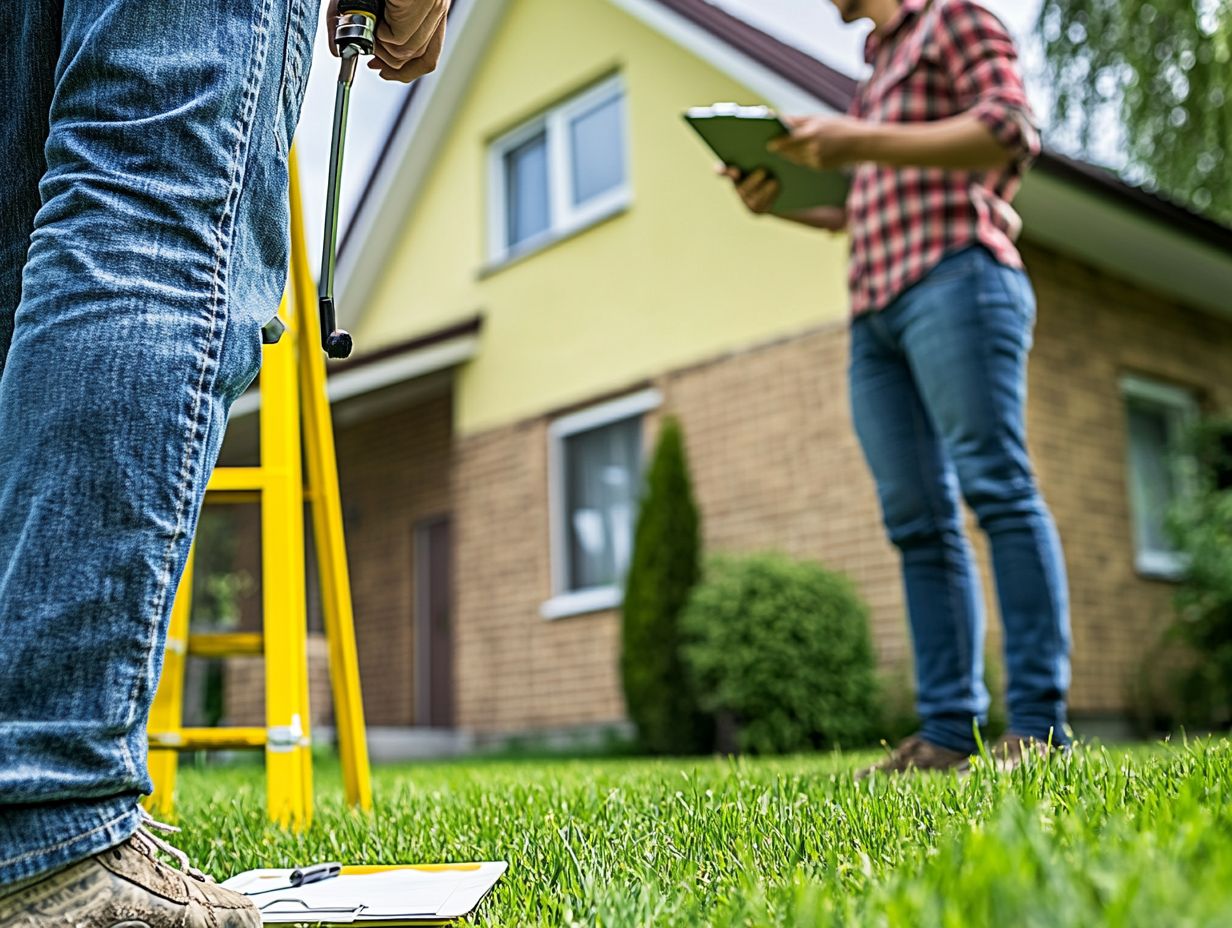
Ensuring safety and compliance is paramount during home inspections. These evaluations help uncover code violations and safety hazards that could impact tenant well-being.
Following safety rules protects your tenants and your investment from potential liability issues.
Routine inspections can expose hidden problems, such as outdated electrical systems or improperly installed heating units, which may pose significant risks.
Compliance with local building codes is essential for maintaining the overall integrity of your rental property. This vigilance cultivates a sense of security among renters and enhances your reputation as a landlord.
When to Schedule a Home Inspection
Timing is essential when you re scheduling a home inspection for investment properties. Ideally, you should arrange it early in the purchasing process.
This approach allows you to assess financial viability and make informed decisions, setting the stage for a successful investment.
Best Timing for Maximum Benefits
To truly maximize the benefits of your investment, consider scheduling home inspections before making an offer. This strategy can significantly bolster your negotiation power.
By identifying potential issues early on, you position yourself to advocate for lower repair costs or even request that the seller address significant concerns prior to closing.
Picture this: discovering minor plumbing issues during the inspection could give you the power to negotiate a reduction in the purchase price, ultimately saving you a substantial amount in future repairs.
Armed with this knowledge, you can engage in informed discussions, leveraging your findings to persuade the seller to make necessary repairs in advance. This proactive strategy lets you avoid unexpected costs after you buy!
What to Expect During a Home Inspection
During a home inspection, you can anticipate a thorough check-up of the property’s major systems, including electrical, plumbing, and heating, ventilation, and air conditioning (HVAC).
A careful check of the home’s overall condition will also take place, ensuring that no detail is overlooked.
The Process and Key Areas of Focus
The home inspection process is all about carefully looking at key areas such as structural integrity, pest infestations, and major systems. This evaluation is vital for spotting potential red flags that could lead to costly repairs in the future.
It’s essential to focus on areas like the roof, where leaks can often remain hidden, and the foundation, which supports the entire structure. These elements can reveal concealed issues that might not be immediately apparent.
The inspector will assess plumbing, electrical systems, and HVAC units to determine their functionality. By addressing these aspects early, you empower yourself to make informed decisions and negotiate necessary repairs.
Choosing the Right Home Inspector
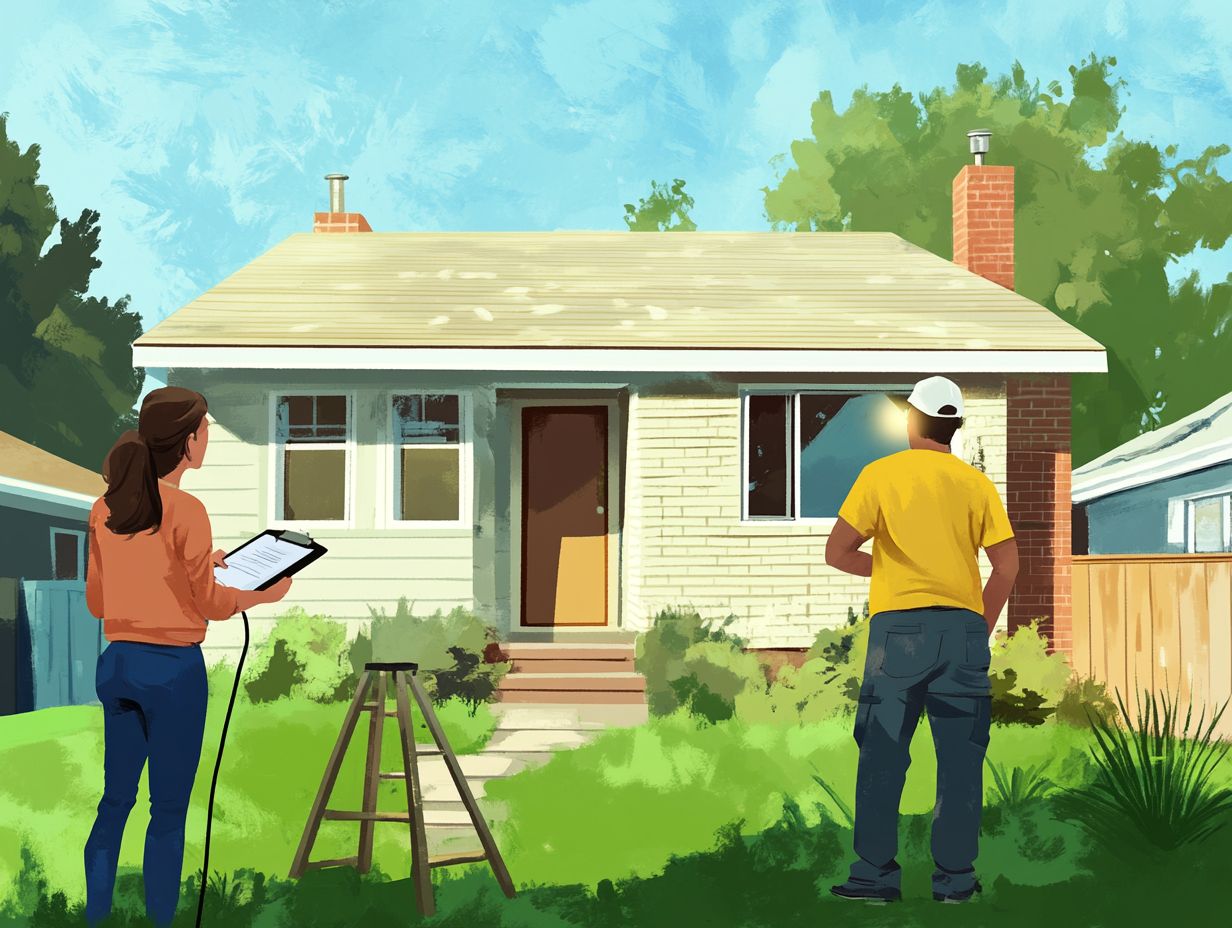
Selecting the right home inspector is crucial for guaranteeing a comprehensive evaluation of your investment properties. Understanding the importance of home inspections in real estate transactions can help ensure that their qualifications and experience play a significant role in determining the accuracy of the assessment.
When selecting a home inspector, prioritize key qualifications and experience, such as certification, a proven track record in property evaluations, and a solid understanding of local building codes.
It s crucial to confirm that the inspector holds the necessary state licenses that validate their expertise. Many qualified home inspectors also have specialized training in areas like mold inspection or energy efficiency assessments.
Hiring an inspector who is a member of a recognized professional body can provide you with additional peace of mind. It shows a commitment to ongoing education and adherence to ethical practices, giving you confidence in your choice.
Key Takeaways:
- Schedule inspections early to enhance your negotiation power.
- Choose a qualified inspector to ensure a thorough evaluation.
- Stay informed about your property s condition to protect your investment.
Schedule your home inspection today to protect your investment and secure your peace of mind!
Addressing Issues Found in a Home Inspection
Addressing the issues uncovered during a home inspection is essential for preserving the value of your investment.
Engaging in effective negotiations with sellers can potentially reduce repair costs and minimize any legal complications that may arise.
Negotiating with Sellers and Making Repairs
Negotiating with sellers based on insights from a home inspection can yield substantial returns on your investment. This ensures that the property’s condition meets your expectations before you seal the deal.
To navigate this process effectively, approach negotiations with a clear understanding of the inspection report. Highlight specific issues that require attention to make a persuasive case for necessary repairs or price adjustments.
Develop a strategy that includes alternative solutions, such as credits at closing reducing your final costs or proposing a timeline for repairs. This can foster a collaborative atmosphere. Being prepared to discuss how these issues might impact the property’s future value will further strengthen your negotiating position.
Frequently Asked Questions
What is the importance of home inspections for investment properties?
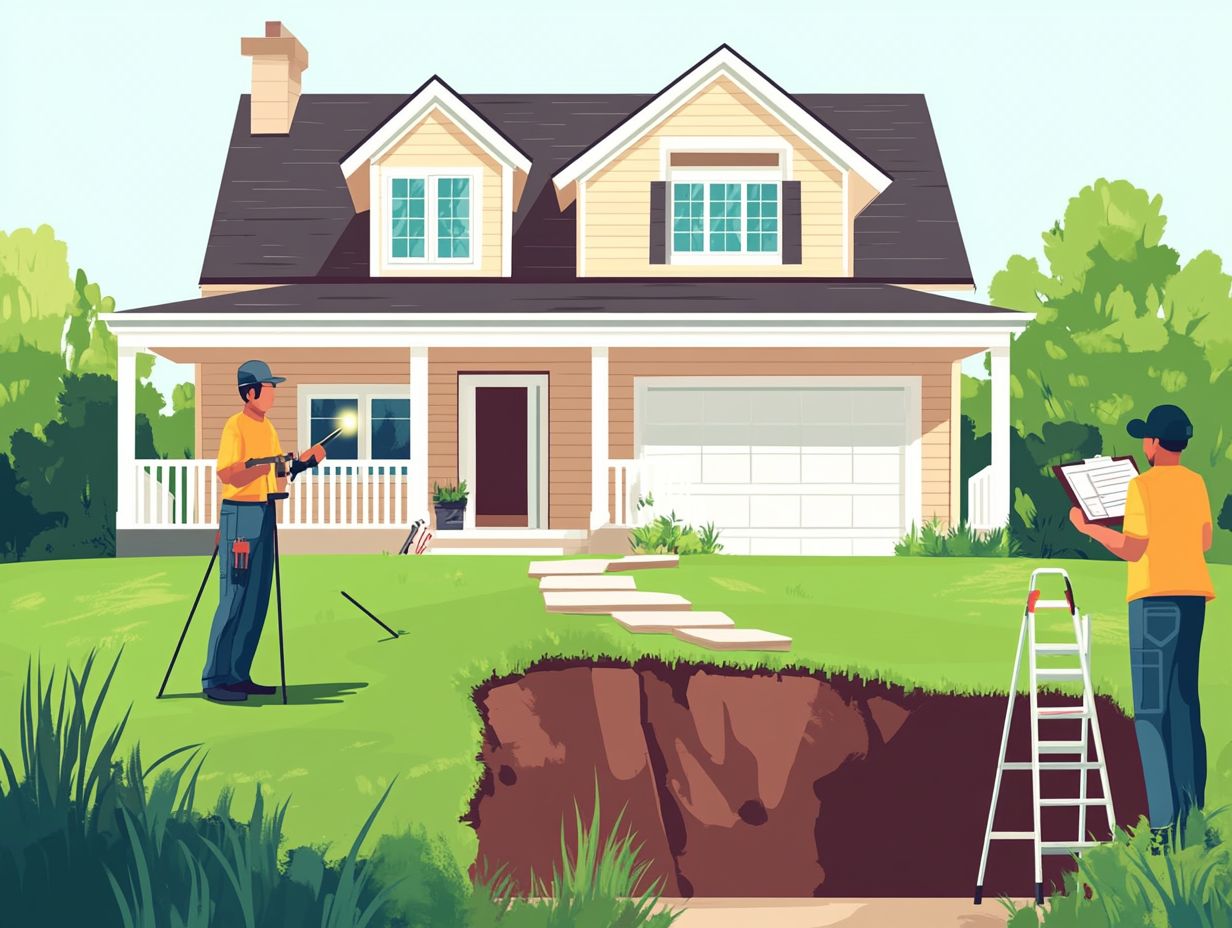
Home inspections are crucial for investment properties, as they provide a detailed analysis of the property’s condition. Understanding the importance of home inspections for investors allows investors to make informed decisions about their potential investment.
How do home inspections benefit investors?
Home inspections identify existing or potential issues with the property and estimate the cost of repairs and renovations. This information helps investors negotiate a fair purchase price and avoid unexpected expenses.
Can home inspections help identify potential safety hazards?
Yes! Home inspections thoroughly examine the property’s structure, electrical wiring, plumbing, and other important components. This alerts investors to any potential safety hazards that may exist, highlighting the importance of home inspections for real estate transactions.
Are home inspections necessary for new construction investment properties?
Even for new construction properties, home inspections are essential. They may reveal construction defects or code violations that could lead to costly repairs in the future.
Who should conduct home inspections for investment properties?
Don t miss the chance to hire a professional and licensed home inspector for a thorough and unbiased inspection of the investment property.
How often should investors schedule home inspections for their investment properties?
It is wise to have a home inspection before purchasing an investment property, as well as before and after major renovations. Understanding the importance of home inspections in property transactions can help ensure that regular inspections every 2-3 years identify maintenance issues that need addressing to maintain the property’s value.

